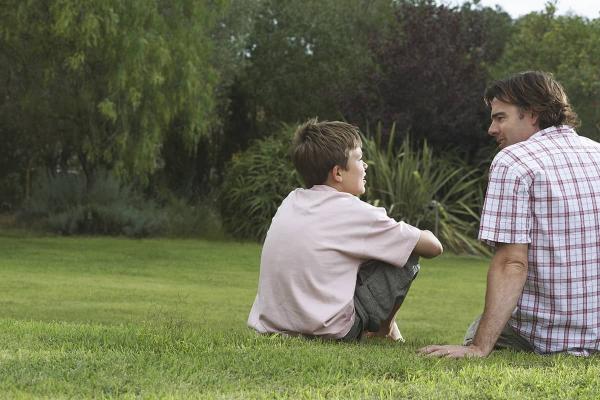
A parent's job is to teach their children, prepare them for the world and help them to know right from wrong. This often involves having conversations with your kids. Though sometimes this can be awkward, they are necessary to assist your children throughout their life. Here are eight talks you should have with your kids.
1. Puberty
Children need to be prepared for this unavoidable event. Knowledge can combat fear and lead to understanding. Though this can be embarrassing to talk about, remember that it happens to everyone. Kids need to know about the changes that will occur or are already happening. Hormones, physical changes, emotions and any other questions your tween or teen has needs to be discussed. If you are unsure about how or what to talk about, find a book or article that you feel comfortable with to help you.
2. Sex
This is probably the most common idea that pops up when you think of talking with your kids. It's important to explore age appropriate ways to talk to your kids about sexuality. Start when kids are toddlers and then continue during teenage years and early adulthood. Keep an open dialogue. Create a comfortable, non-judgmental atmosphere where your child feels safe to ask questions and learn. Decide what family values are important and instill those in your children. Easy times to talk about it may be during potty training or bath time, before and during puberty and when your child begins to show interest in or starts dating.
3. Sexual abuse
This subject can easily be discussed along with the sex talk. An estimated 1 in 10 children under 18-years-old will be sexually abused. This happens to kids regardless of gender, race, socioeconomic status or religion. Perpetrators can be parents, siblings, aunts or uncles, cousins, friends, teachers, grandparents or sometimes strangers. Explain to your kids appropriate and inappropriate touching. Tell them to tell you if anyone ever tries to or does touch them in this way, even if they were threatened, are afraid or were told it was a secret. If abuse occurs, help them to know it is not their fault and that you love them. Seek professional help and healing such as therapy or counseling.
4. Family values
The home is the first school for your children. It is important to talk about the values that are important to your family. Honesty, chastity, service, kindness and hard work are just some of the values you may want to discuss. Kids want and need direction and boundaries. They likely will not find it on their own, but need to be guided, taught and loved to learn. You are your child's best example, so make sure to show, not just tell, them.
5. Drugs, alcohol and other substances
Harmful substances come in many forms today - some are even meant to look like candy. Teach your children to be cautious and avoid situations that can make them vulnerable. Underage drinking, illegal drug use, abusing prescription medicines, smoking or overuse of energy drinks can lead to jail time, health problems or even death. Explain the risks, keep an open dialogue and share ideas about how to say "no" and how to have fun without dangerous substances.
6. Bullying
There are two sides of this conversation. The first is to not be a bully. Encourage children to be kind to everyone. Teach them to be friendly and to look out for those that need a friend and include them in their friendship circle. How you treat your children is often reflected by how they treat others. The second is to talk to your kids about being bullied. If this is happening, involve the school where necessary and try to find out the whole story. Help your child to know and feel they are loved. More information is available at www.stopbullying.gov.
7. Choosing and making good friends
Friends have a large impact on choices you make throughout your life. Most kids don't do dumb things alone. Help your child to know how to seek friends with similar family values. Teach your children to avoid kids that pressure them to make bad choices or that do not have respect for your family values. Explain what a good friend is and how they act. Make sure your child learns how to be a good friend in return.
8. TV, movies, books, music and Internet
All of these are good if used with restrictions and guidance, but can lead to unhappiness if used without discretion. Violence, pornography, foul language and vulgarities are found in each of these forms of media. Explicit lyrics and written word and sexually suggestive or violent acts are more common now than ever before and can have a negative impact on those that partake. Turn it off, unplug it, click the "x" or put down the book are things that you can teach your child to do if they see, hear or read something that is not in line with your family values. Monitor their media activities closely and discuss with them things that are OK and not OK. Encourage them to talk to you if they accidentally see something inappropriate.
Children need the loving guidance of their parents. Having important talks with your kids is one key to helping them avoid pitfalls and dangers in life. Being a solid example and having a willingness to speak openly will help your children. Set aside time to talk and have casual unplanned chats with your children often.

